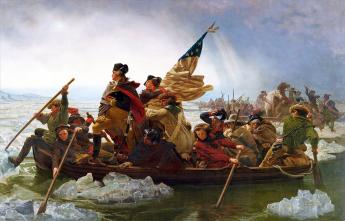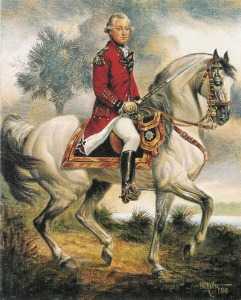Related Topics
The British Attack Philadelphia
Fighting in the Revolutionary War lasted eight years; for two years (June 1776 to June 1778) Philadelphia was the main military objective of the British.
Revolutionary Philadelphia's Patriots
All kinds of people were patriots in 1776, and many of them were all mixed up about what was going on and how they stood. Hotheads in the London Coffee House stirred up about an inoffensive Tea Act, Scotch-Irish come here to escape the British Crown, the local artisan class and the local smuggler class, unexpectedly prospering under non-importation, and the local gentry -- offended to be denied seats in Parliament like other Englishmen. Pennsylvania wavered until Ben Franklin stepped forward with a plan.
Right Angle Club 2011
As long as there is anything to say about Philadelphia, the Right Angle Club will search it out, and say it.
Robert Morris: Think Big
Robert Morris wasn't born rich, or especially poor, but he was probably illegitimate. He had no recollection of his mother; his father, a tobacco trader in England, emigrated to Maryland and died rather young. It didn't take long for young Robert to become one of the richest men in America.
Revolution in New Jersey
Early, brief but significant.
Christmas, 1776, Behind the Scenes at Trenton

|
| Washington Crossing Delaware |
Cornwallis and the British regulars came thundering down the narrow waist of New Jersey from New Brunswick to Trenton, just before Christmas, 1776. Washington's troops retreated before them, fleeing to the Pennsylvania side of the Delaware River. The British then fortified the Hessians in Trenton and went back into their own winter quarters nearer New York. Plenty of time seemed available to finish off Washington in the Spring, and then leisurely conquer the enemy's capital in Philadelphia. The Continental Congress thought so, too, and moved its capital to Baltimore. Only three members of the Congress, Robert Morris, George Clymer, and George Walton (of Georgia), remained in Philadelphia to run the government; Morris was essentially in charge, in the role of financier whatever that meant. With Congress seeking refuge, Morris was for practical purposes, acting President of the United States. Washington swept up all of the boats on Delaware, set up camp on the Pennsylvania side, and begged Morris to get him some money to reward re-enlistments by January 1. Others saw the end of the year as Christmas time; Washington saw it as the end of the year when enlistments expired. He quite plainly stated that it was all over for the Continental Army unless he could get some hard currency, silver preferred, to show the troops that the rebellion could survive another year. About ten dollars per soldier would probably do it, but then there was also a need for hard money to buy food and supplies for the starving troops.

|
| General Charles Cornwallis |
Just how Morris managed to find the money is unclear, or how much of it was his own. But he did manage, with the lucky arrival of a gunpowder smuggling ship from France, and eighteen cannon somehow supplied by General Knox. The Colonials rallied to re-cross Delaware, surprise the Hessians, outmaneuver Cornwallis as he once more thundered back down the New Jersey waist, now intent to wreak vengeance. The military essence of it all reached a climactic moment when Washington used fake bonfires to trick the British while he sneaked around them. Captain Sam Morris and Philadelphia's First City Troop managed the bonfire deception. When cannon fire in Princeton announced the trick, the British raced back to their ships at Staten Island to protect their supplies before Washington who now had a head start, could get to the ships, leaving the British to starve in the woods. Both sides were exhausted by the chase, and although he had won this race, Washington had to retreat to winter quarters in Morristown, New Jersey (named after a former New Jersey Governor.) Meanwhile, with Congress taking refuge in Baltimore, Philadelphia was nearly deserted except for some Quakers who felt they had no quarrel with the British. And Robert Morris, who continued to run his smuggling operation with Beaumarchais the famous playwright on the French end of it. Tradition has it that some Quaker gardens were dug up to find enough silver to reward reenlistments, and if so it is unclear how much was freely contributed and how much was just plain stolen; indeed, how much of it might have been Morris' own money. By the next fall, Washington was able to fight the largest battle of the war at the Brandywine Creek, so Morris must have been very active smuggling guns and gunpowder to resupply the Colonials during that intervening winter and spring.
During periods of the lull in infantry warfare, other warfare including privateering at sea, blockades, and the diplomatic intrigue in Paris, were unmerciful. If Washington's army had been wiped out, the Revolution would have ended. But other misadventures might have ended it as well. The colonists were demoralized, and their dismay was summarized by a letter from Morris to Silas Deane, a line of which was the bitter observation that "Sorry I am to say it, many of those who were foremost in noise, shrink coward-like from the danger.".
A few days before that fateful Christmas, Ben Franklin had arrived in Paris to take over our diplomatic mission with the French. When the news of Washington's victory reached him, the new American arrival was being acclaimed as the world-famous scientist and witty author and was thus in a position to make the most of it with the French court. He may be forgiven for exaggerating Washington's exploits a little. The Trenton victory was rough and ragged, but it would serve. Washington, Franklin, and Morris. The three Americans who mainly won the Revolutionary War for us now took the stage, front and center.
Originally published: Monday, April 04, 2011; most-recently modified: Wednesday, May 15, 2019
| Posted by: Max Koppel | Dec 20, 2012 2:25 PM |